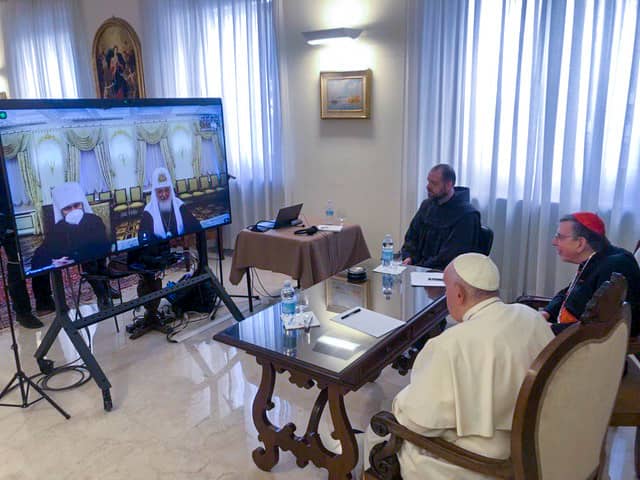ROME – Yesterday, former Senator Joseph Donnelly presented his credentials to Pope Francis as the 12th Ambassador of the United States to the Holy See, since the beginning of formal diplomatic relations under President Ronald Reagan in 1984.
Ironically, Reagan wanted closer ties with the Vatican under Pope John Paul II in part because of perceptions that the U.S. and the Polish pope had a common enemy in the Soviet Union, i.e., Russia. Today, Donnelly steps into the ambassador’s role when that common enemy is back with a vengeance amid the ongoing crisis in Ukraine.
As a result, one could make a good case that Donnelly steps into his new role at a propitious moment to be the American envoy to Pope Francis’s Vatican. That’s important, in part because it hasn’t always been so.
From the beginning, Pope Francis has made his personal ambivalence about the United States clear, especially American conservatism – from the infamous “ecumenism of hate” essay by two of his closest friends and allies denouncing a perceived partnership between conservative Catholics and Evangelical Protestants in America, to his more recent swipe at EWTN as doing “the work of the devil” for its criticisms of his papacy.
It’s also probably fair to say that during the Trump years, when Francis looked across the Atlantic he often didn’t like what he saw. Memories here are still fresh of the moment in 2020 when then-U.S. Secretary of State Mike Pompeo complained that the Vatican was squandering its moral capital by making a deal with Communist China, a suggestion at which Francis’s top diplomatic personnel clearly bristled.
That baggage comes atop the Vatican’s broad commitment to multilateralism in foreign policy, an approach that dates back to the era of John XXIII and Paul VI in the 1960s. Prior to that point, the pope was sometimes referred to as the “Chaplain of NATO,” reflecting a perception of a pro-Western orientation in Rome. In the decades since, the Vatican has tried to reposition itself as an independent pole in global affairs no longer beholden exclusively to the Western powers, and on good terms with other spheres of global influence too, very much including Russia.
In part, the outreach to Russia is part of the Vatican’s ecumenical strategy that puts a premium on healing the rift with Orthodoxy. Yet even at a personal level, early on there seemed almost a budding partnership between Francis and Putin.
In 2013, the two leaders were on the same page in opposing Western moves towards the use of military force in Syria to dislodge the regime of President Bashar al-Assad. During much of 2014-2017, the Vatican also appreciated the role Russia played in defending Christians in the Middle East from the onslaught of ISIS. Certainly, many of the Middle Eastern bishops will tell you they got far more help from Putin’s Russia than from the U.S. under President Barack Obama, and they were telling Francis and the Vatican’s diplomatic establishment the same thing.
Now, however, the calculus appears to have changed.
Recently, Italian Vatican writer Piero Schiavazzi argued that the war in Ukraine actually marks the end of Vatican multilateralism, as the rhetoric coming from Pope Francis and top Vatican diplomats has taken on an increasingly anti-Russian edge – even if the pontiff still hasn’t managed to actually use the words “Russia” or “Putin” in any of his public commentary. On Palm Sunday, for example, Francis suggested that Christ is crucified anew amid the “folly of war,” which basically casts Putin in the role of Christ’s executioners.
(Footnote: In addition to his work as a journalist and essayist, Schiavazzi is also a professor of Vatican Geopolitics at Link Campus University in Rome. How do I get a gig like that? Being a “professor of Vatican Geopolitics” sounds awfully cool.)
“The period of peace in Europe is over,” Schiavazzi said in an interview with the EURACTIV news agency, describing how, now that Europe is at war, the pope considers Putin to represent the “uncivilized world.”
Schiavazzi believes we’re witnessing a fundamental shift in the world order, one in which the Vatican will return to its traditional position as a spiritual and moral buttress of a basically Western human rights and rule of law agenda.
Only time will tell whether that forecast turns out to be on the money. Among other things, as both presidents and popes change, perceptions of alliances and geopolitical priorities can shift accordingly.
For right now, what does seem clear is that Donnelly arrives at a moment of deep global upheaval, which means he’ll be seeing a lot of the Vatican’s top brass for both formal and, more often, informal conversations. For once in the Pope Francis era, those exchanges won’t be contentious. Instead, vis-à-vis Ukraine, the United States and the Holy See are basically on the same side, which creates the possibility of all sorts of new partnerships between the world’s most important hard and soft powers, respectively.
That reality marks a significant change in climate – a “great thaw,” perhaps – between Washington and Rome. Where it may lead remains uncertain, but if you’re Joseph Donnelly today, you may be content just to ride this wave as long as it lasts.
Follow John Allen on Twitter: @JohnLAllenJr















